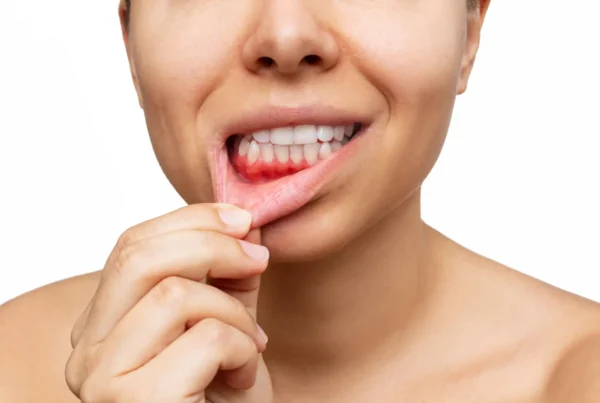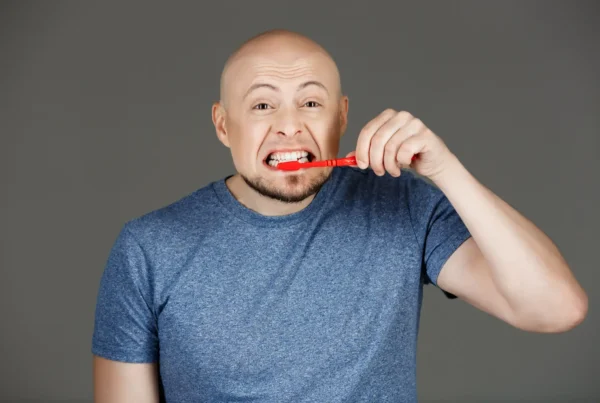- Family brushing teeth
- Diseases that may be related to dirty teeth
- 5. Lung infections
- Dirty teeth in children – serious consequences for life
- What can you do to keep your teeth clean?
- Summary: Clean teeth are not just about aesthetics – they are about your health
- Well-cared-for teeth = a clear conscience, better health, and peace of mind.
For many people, brushing their teeth is just a quick morning and evening routine – something that “has to” be done, but which is difficult to take seriously. However, poor oral hygiene is not just a risk of bad breath or discoloration. More and more studies show that dirty teeth and bacterial plaque can have a real impact on overall health – the heart, joints, and even pregnancy.
 Neglected teeth are not a cosmetic problem. They are a systemic problem. Here, we look at what happens in the body when we don’t take care of our oral hygiene and why it is worth treating a toothbrush as a basic tool for preventive health care.
Neglected teeth are not a cosmetic problem. They are a systemic problem. Here, we look at what happens in the body when we don’t take care of our oral hygiene and why it is worth treating a toothbrush as a basic tool for preventive health care.
Family brushing teeth
Dirty teeth = bacterial plaque = inflammation
Let’s start with the basics: when we don’t brush our teeth thoroughly enough, bacterial plaque builds up on their surface – a soft, sticky film composed of bacteria, food debris, and saliva. Within 24–48 hours, this plaque can turn into tartar, which cannot be removed with a toothbrush alone.
It is the bacteria in plaque that are responsible for:
- gum inflammation (gingivitis),
- periodontitis (inflammation of the periodontium),
- cavities,
- and the penetration of toxins and bacteria into the bloodstream.
Doesn’t sound serious? In a moment, we’ll see what can happen next.
Diseases that may be related to dirty teeth
1. Heart and circulatory diseases
Bacteria living in the mouth (especially Porphyromonas gingivalis) can enter the bloodstream and exacerbate inflammation in the blood vessels. People with gum problems are much more likely to suffer from diseases and conditions such as:
- atherosclerosis,
- ischemic heart disease,
- heart attacks,
- strokes.
Many cardiologists agree: the heart begins in the mouth.
2. Dementia and Alzheimer’s disease
Recent studies suggest that the same bacteria that cause periodontal inflammation may have a neurotoxic effect. They have been found in the brains of people suffering from Alzheimer’s disease. The relationship has not yet been fully confirmed, but the correlation between oral health and mental performance is becoming increasingly likely.
3. Pregnancy complications
In pregnant women, untreated gum inflammation can lead to:
- premature birth,
- low birth weight,
- preeclampsia.
For this reason, many gynecological societies recommend dental check-ups and treatment of oral diseases before pregnancy.
4. Rheumatoid arthritis (RA)
Patients with RA are much more likely to suffer from advanced periodontitis, and vice versa – people with chronic periodontitis are at higher risk of developing joint diseases. Chronic inflammation and bacteria that can “trigger” the body’s autoimmunity are to blame.
5. Lung infections
In elderly people, bedridden patients, or those with neurological problems, bacteria from the mouth can enter the respiratory tract and lead to pneumonia. This is known as aspiration pneumonia, which is very difficult to treat and life-threatening.
Symptoms that say, “Your teeth are dirty”
- bleeding gums when brushing,
- unpleasant mouth odor despite regular brushing,
- white or yellow coating at the base of the teeth,
- exposed tooth necks, loose teeth,
- frequent mouth ulcers and irritation in the mouth.
These are not “minor problems.” They are warning signs.
Dirty teeth in children – serious consequences for life
Parents often neglect oral hygiene in young children, assuming that baby teeth “will fall out anyway.” This is a huge mistake. Tooth decay in baby teeth:
- can spread to the buds of permanent teeth,
- leads to premature tooth loss and speech disorders,
- can be a source of chronic pain that a child is not always able to communicate,
- affects self-esteem and social relationships.
What can you do to keep your teeth clean?
Below are some tips that are worth following.
- Brush your teeth twice a day for at least 2 minutes. Use a manual, electric, or sonic toothbrush – it is important that it is suited to your needs.
- Clean the spaces between your teeth. Dental floss, interdental brushes, or an irrigator (e.g., Smilesonic AquaFlow) will help remove what a toothbrush cannot reach. Rinse your mouth. Use mouthwash, but not as a substitute for, but as a supplement to your overall dental and gum hygiene. Fluoride or anti-inflammatory mouthwashes can help, especially if you have gum problems.
- Replace your toothbrush every 3 months. Worn bristles do not clean effectively and can even damage your gums.
- Visit your dentist every 6 months. Professional cleaning, scaling, and regular dental checkups are essential, even if nothing hurts.
Summary: Clean teeth are not just about aesthetics – they are about your health
Dirty teeth are not just a matter of appearance. They pose a real threat to the health of the entire body – from the heart to the joints to the brain. Neglecting daily oral hygiene can lead to systemic diseases, lower immunity, and negatively affect quality of life.
Well-cared-for teeth = a clear conscience, better health, and peace of mind.
If your last visit to the dentist was more than six months ago, now is the time to schedule a checkup. Your body will thank you for it.




